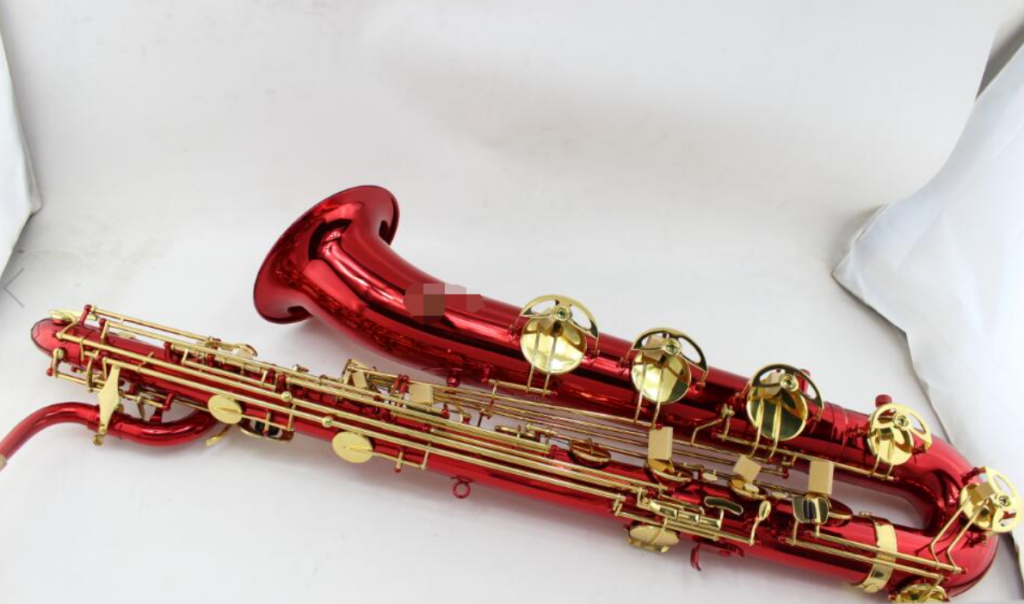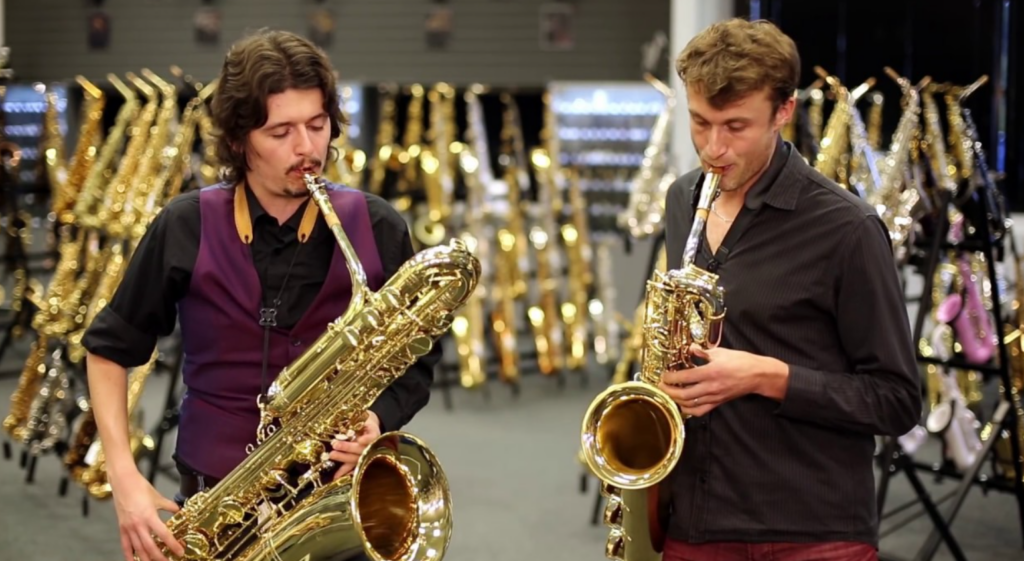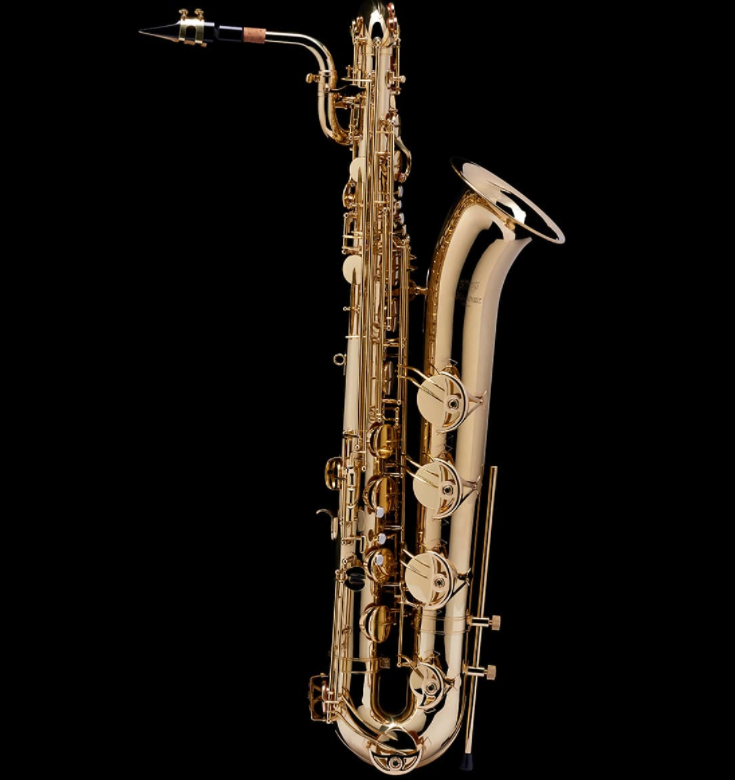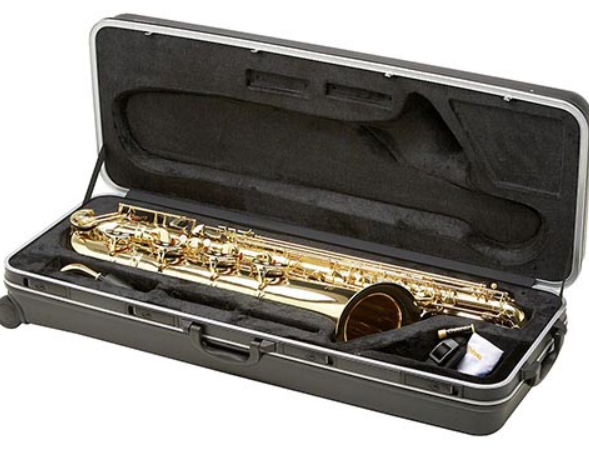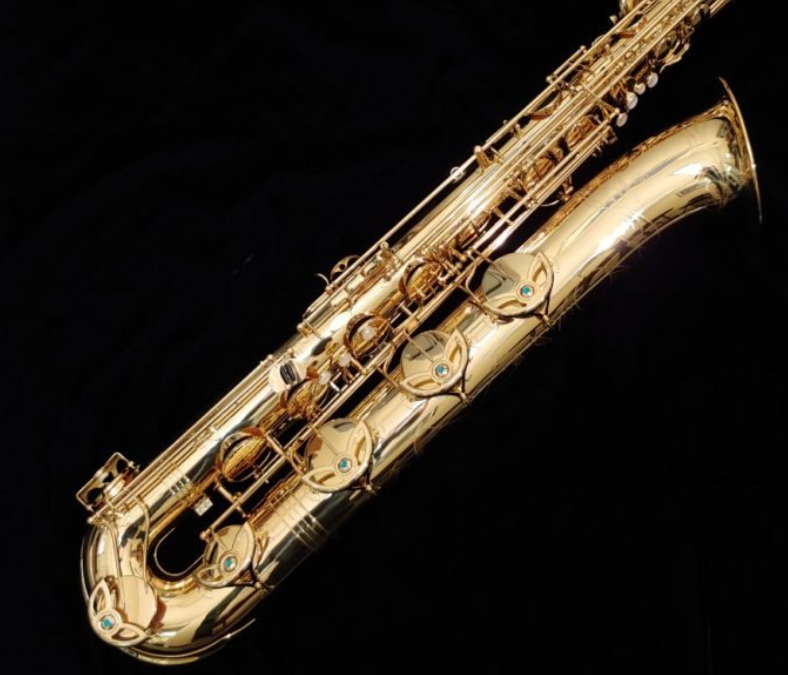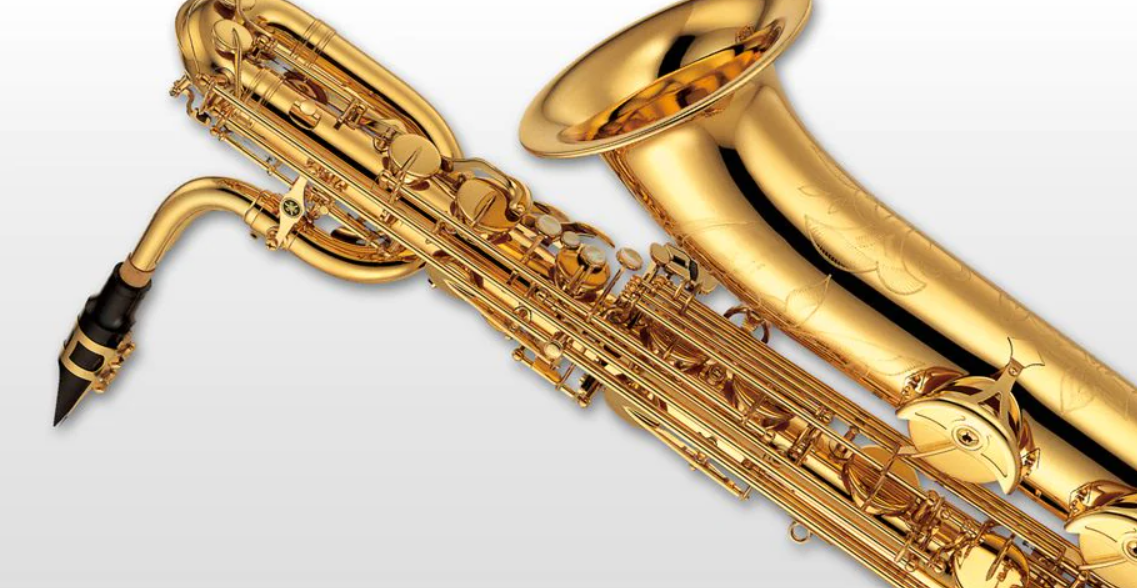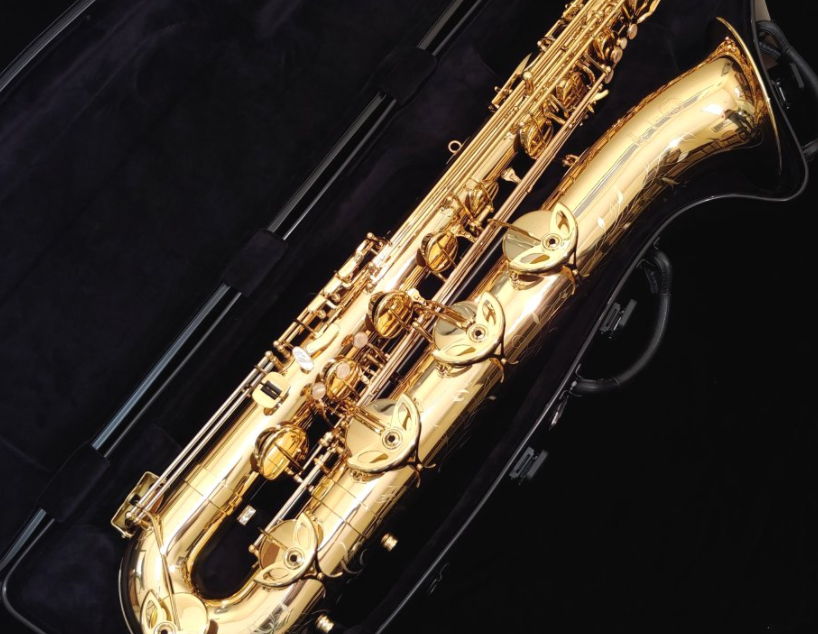- How to Find the Best Alto Trombone - May 31, 2022
- How to Find the Best Bass Trumpets - April 23, 2022
- Best Yamaha Saxophones Brand Guide - April 21, 2022
The baritone sax has the reedy, piercing sound you expect from saxophones. But it can also play with a mellow, smoky sweetness like a euphonium or French horn. While it’s the biggest commonly used saxophone, the baritone can handle quick passages with a speed and delicacy that belies its size. It’s easy to fall in love with the baritone sax sound and easy to wince when you see the price tags.
If you’re in the market for a baritone saxophone, keep reading! I’ve compiled a list of the best baritone saxophones for players at every level. While none of these instruments are cheap, each will repay your investment with a lifetime of beautiful music.
Bottom Line Up Front: I believe the Yamaha YBS-62 will be their best choice for most baritone saxophonists. While other saxophones on this list may be better for the most advanced performers or specialized situations, the YBS-62 will meet the needs of students and professional baritone sax players alike.
How I Chose the Best Baritone Saxophones
Here are some of the things I considered when ranking baritone saxophones.
Player Ability
Every baritone sax player needs a sturdy instrument that blows in tune and holds up to hours of practice. But a beginner can learn proper performance on a more modestly priced instrument with fewer features. More advanced saxophonists can benefit from the added features and improved tone of a more expensive baritone. A student instrument leaves a beginning baritone sax player with more money for music lessons.
Cost/Value Ratio
Baritone saxophones are expensive. The cheapest instrument on this list costs over $2,000, and you can spend well over $20,000 on a top-of-the-line baritone saxophone. I look for saxophones that give you your money’s worth at different price points and for different purposes. A baritone sax with poor intonation and stuck keys will only serve to waste your money and discourage your student.
Reputation
Many online instrument resellers are offering unbelievably cheap instruments. When you get your unplayable saxophone in the mail and can’t reach their customer service, you discover those prices were too good to be true. All the baritone saxophones on this list are sold by reputable companies that stand behind their products and have a solid reputation for quality control.
A Brief History of the Baritone Saxophone
In the 1840s Belgian instrument maker, Adolphe Sax began developing an instrument that combined the projection of a brass instrument with a woodwind’s dexterity. The saxophone had a single reed like a clarinet and similar fingerings, but its conical brass body gave it a much different tone. Sax’s 1846 patent listed 14 versions of the original design, with sizes ranging from sopranino to contrabass.
Sax’s original design for the E♭ baritone saxophone went down to concert pitch C#2. Many players began adding extra length between the bow and the bell to get to a useful concert C2 (written as a low A in baritone sax music). This solution put several of the lower notes out of tune and caused a generally poor tone. In the late 1950s, Selmer Paris began producing a baritone saxophone with a properly tuned C2 and better intonation. Since that time, the “low A” key has become standard on almost all modern baritone saxes.
Today most baritone saxophones also come with a high F♯ key that increases your range before you need to start blowing altissimo and gives you more fingering options for fast or difficult changes.
Great Baritone Saxophonists
Some of the most famous baritone saxophonists include:
- Gerry Mulligan: Cool jazz legend and bandleader Gerry Mulligan taught us how sweet and light a baritone sax can sound. From 1953 to 1995, Mulligan topped DownBeat‘s reader poll as the most outstanding baritone saxophone player. No musician before or since has come close to his 42-year winning streak.
- Bob Gordon: Although his career was tragically cut short in 1955 at the age of 27, Bob Gordon’s cool jazz stylings are considered by many jazz critics to be some of the finest baritone sax playing ever recorded.
- Serge Chaloff: Bebop’s greatest baritone sax player, Serge Chaloff, kicked heroin addiction only to succumb soon afterward to spinal cancer. Chaloff is noteworthy for his great dynamic range and the emotional sensitivity of his interpretations.
- Terry Harrington: While she also plays guitar, bass, piano, alto sax, accordion, violin, tuba, and French horn, Lisa Simpson’s true musical love is her baritone saxophone. For the past 20 years and counting, session musician Terry Harrington has provided Lisa’s baritone sax lines in every Simpsons intro.
The Best Baritone Saxophones
Best Beginner Baritone Saxophone: Wessex Baritone Saxophone SAX110
Wessex is a British/Chinese company that has become famous for providing solid, reliable student instruments at very reasonable prices. If you’re a saxophone newbie, the SAX110 will be an excellent learning tool. If you’re getting bad sounds out of the SAX110, you know the problem lies with your technique and not your instrument. And because Wessex has solid quality control, your SAX110 will last till you’re ready for a more advanced instrument and serve as a solid rehearsal and travel sax afterward.
While the Wessex SAX110 is a fine baritone saxophone for beginners, it is equally well-suited for limited professional use. If you just need a baritone sax for a couple of numbers, the SAX110 lets you add a serviceable new axe to your collection for less than you might expect. You might want to check out some of our other listings if you’re a pro baritone player looking for your primary saxophone. But for second instrument use, the SAX110 offers a lot of bang for a reasonable number of bucks.
At over $2,000, the SAX110 is not what most of us would call cheap, but it’s a fraction of the price you’ll pay for the other baritone saxophones on this list. The case and mouthpiece are serviceable, but you can do better and will probably want to as your playing improves. (Tangentially, if you already own a saxophone but aren’t satisfied with the sound, a mouthpiece change is an easy, affordable upgrade that can improve your instrument more than you might suppose).
Pros
- Wessex has solid quality control
- A very good baritone saxophone for much less than others on the market
- Will serve well as a second instrument or rehearsal/travel sax
Cons
- May want to upgrade case and mouthpiece
Specs
- Key: E♭
- Range: Low A to High F#
- Body: Yellow brass
- Foam body case
Best Marching Baritone Saxophone: Allora ABS-450 Vienna Series Baritone Saxophone
The Allora ABS-450 is found in many school bands, where its fat sound and solid intonation across all registers help it stand out on a marching field. The ABS-450 has a lacquered brass body, neck, and bell along with leather pads by Italian woodwind pad maker L. Pisoni and an adjustable thumb rest.
Because very few middle school bands will use a baritone, the Allora ABS-450 is built for older to adult students. The ABS-450 has a better tone and response than basic student instruments. But it also means that, unlike those beginning instruments, ABS-450 designers concentrated more on getting a good sound than on making an instrument that can tolerate manhandling by young children. The ABS-450 is a great instrument for serious students who can treat their instrument respectfully, but you may need regular adjustments during marching season.
This trade-off between durability and sound is found in most musical instruments. A more sophisticated instrument made to exacting specifications may lose a lot of sound quality if anything throws those intricate key setups out of whack. But learning how to keep your baritone saxophone maintained and protect it from damage is an important part of becoming a better musician. If you are up to that challenge, the ABS-450 is a great step-up instrument.
Pros
- The strong sound throughout all registers
- Comfortable fingering and key action
- A great step-up saxophone
Cons
- More fragile than student instruments
Specs
- Range From Low A to High F#
- Fully Ribbed Construction
- Upper and Lower Stack Adjustment Screws
- Adjustable Thumb Rest
- Pisoni Pads
- Triple Ring Strap Hook
- Accessories included: Mouthpiece, Ligature, Neck Strap, Polishing Cloth
- Fabric Covered, Plush Lined Case With Two Exterior Pockets, and Back Pack Straps
- 3 Year Limited Warranty
Best Jazz Baritone Saxophone: Yanagisawa B-WO1 Series Baritone Saxophone
While Yanagisawa is best known for its soprano sax, its entire saxophone line is highly regarded by jazz musicians. If you want to blow some bebop, the Yanagisawa B-W01 is the baritone sax for you. The front F key is slanted for easier, more ergonomic use, and the blue steel springs give a quicker key response than the more commonly-used (and cheaper) stainless steel variety. And the lacquered brass body gives the B-W01’s sound a hard, bright edge that will stand out in an ensemble and cut through the chaos of a jazz-rock jam.
The B-WO1 features improved compound materials, adjusted tone hole sizing and positioning, and an added neck pipe plate. This gives the B-W01 a cleaner tone, better intonation, and smoother fingering. The strap ring has been repositioned for more comfortable playing, and the B-W01 features a wider right-hand keyguard exclusive to Yanigasawa’s baritone models. The B-WO1 also comes with a Yanagisawa Ebonite 5 mouthpiece: Yanagisawa’s mouthpieces are highly regarded even by musicians who play other saxophones.
Pros
- Clear, loud overtone series and altissimo range
- Superb responsiveness
- Top-notch build quality
Cons
- Because Yanagisawa is a small company, it may be difficult to find a local store that carries their line
Specs
- Body Material: Brass, Gold Lacquered (also available in bronze lacquered, brass silver-plated, and solid silver options)
- Construction Style: Single Post to Body Construction
- Range: Low A to High F#
- Pads: Premium Leather with Domed Nylon Resonators
- Mouthpiece: Yanagisawa Ebonite 5
- Case: Yanagisawa Deluxe Case
- Country of Manufacture: Handmade in Japan
Best Professional Baritone Saxophone: Yamaha YBS-62 Professional Baritone Saxophone
When the YBS-62 was introduced in 1982, most other saxophone makers were treating baritone saxophones like gigantic altos. Yamaha was one of the first to concentrate on a baritone player’s specialized needs. The ergonomic key layout makes the YBS-62 comfortable for saxophonists with more modestly sized hands, and the optional bottom peg can help you support the weight of your baritone through long hours of practice or performance.
Yamaha is one of the world’s leading instrument makers, and Yamaha instruments can be found in middle school bands and leading symphony orchestras. The YBS-62 is equally suited for students and professionals at any stage of their careers. The YBS-62’s huge, bold tone will provide a solid base for a saxophone quartet or a horn section. Students will appreciate the YBS-62’s durability and easy blowing. And while $9,000 is a big investment, the YBS-62, like all Yamaha instruments, holds its resale well if your student decides they prefer the xylophone.
For almost every level of a baritone saxophone player, the Yamaha YBS-62 will be a lifetime instrument. The YBS-62 is rugged enough to hold up to rehearsals, luggage compartments, and away games. It will take you from your first scales through conservatory and into a career.
Pros
- Yamaha is famous for its quality control and customer service
- The fat, round low-end sound
- Free blowing to help you reach high into the altissimo range
Cons
- While many praise the Yamaha house sound for accuracy and consistency, some find it a bit sterile.
Specs
- Level: Professional
- Neck, Body, and Bell: Yellow Brass (annealed)
- Key Material: Yellow Brass
- Key Buttons: Mother of pearl
- Finish: Gold baked epoxy lacquer (YBS-62); Silver (YBS-62S)
- Tone Holes: Drawn
- Auxiliary Keys: Front F; Low A; High F#
- Mouthpiece: Yamaha 5C
- Mouthpiece Cap: Yellow Brass; Gold Lacquer
- Ligature: Yellow Brass; Gold Lacquer
- Spring Type: Blue Steel Needle
- Pad Type: Leather and wool felt with plastic tone boosters
- Bell Decoration: Hand Engraved
- Thumb Hook: Adjustable plastic
- Pivot Screw: Straight-tapered with head and nylon lock (adjustable)
- Mounting: Ribbed and flanged
Best Cost-No-Object Baritone Saxophone: Selmer Model 66AFJ Series III Baritone Saxophone
In 1922 French clarinet maker Henri Selmer introduced a new Modele 22 line of saxophones ranging from sopranino to bass. Selmer went on to build saxophones played by jazz legends like Stan Getz, Coleman Hawkins, Dexter Gordon, Sonny Rollins, and Wayne Shorter. The Selmer 66AFJ baritone saxophone represents the culmination of a century of Selmer research and development.
The Model 66AFJ Series III is the replacement for the 1980 Super Action 80 Series III saxophones. Like those horns, the 66AFJ features an ergonomic key layout that allows you to play comfortably at high speeds and through challenging passages. Its tone is strong, clear, and suitable for almost every playing situation. And while Selmer was traditionally known for great sound but sometimes spotty quality control, the 66AFJ is a solidly built and durable saxophone that also has the stylish elegance you want when performing onstage.
The only thing wrong with the 66AFJ is the price, which starts at over $16,000. The finest rarely comes cheap, and Selmer saxophones have historically been considered the gold standard among professionals. If you want the best baritone saxophone money can buy, you will have a very hard time finding an instrument finer than the 66AFJ.
Pros
- Selmer saxophones have long been considered the world’s finest
- Key layout built for ergonomic playing through challenging passages
- An heirloom instrument that can be passed down through generations.
Cons
- Expensive
Specs
- Country of Manufacture: 100% Made in France
- Finish: Jubilee Series Honey Gold Lacquer
- Pearls: Mother of Pearl
- Pads: Pisoni Pro pads with Metal Resonators
- Range: Low A – High F#
- Body Material: Yellow Brass
- Body Construction: Mini-Rib
- Mouthpiece: Selmer Paris S80 C*
- Case: Selmer Paris Pro Series Case
My Recommendations
For most musicians, the Yamaha YBS-62 will be the best baritone saxophone for their needs. The YBS-62 is an excellent student instrument but is also well suited for professional work on stage or in the recording studio.
Many jazz baritone saxophonists might prefer the Yanagisawa B-WO1 for its easy action and bright tone, while those with bigger budgets might favor the classic sound of the Selmer Model 66AFJ. Both are excellent instruments that will put a smile on the face of even the most fashionably dour jazz saxophonist.
If you are a beginner or looking for a baritone saxophone as a second instrument, the Wessex SAX110 is a solid and reliable baritone sax for a very reasonable price.
Frequently Asked Questions (FAQ)
Answer: When it comes to fingerings and blowing, a baritone saxophone is no harder to play than any other saxophone. If you are coming to the baritone sax from a tenor, you may have to adjust to playing an E♭ instrument that blows the notes a fifth lower than a tenor. If you already play alto saxophone, you will have to get used to a considerably larger and heavier instrument with wider key spacing.
Answer: The E♭ baritone saxophone, like all saxophones, is a transposing instrument. Baritone saxophone music is written an octave plus a major sixth higher than the note the baritone saxophone produces. Music for alto sax, also an E♭ instrument, is written a sixth higher than played. Baritone saxophonists playing a piece written for alto sax will produce the music a full octave lower.
While trombone, tuba, and bassoon music are written to concert pitch (non-transposing), a baritone saxophonist can play it by reading the music as if the bass clef were a treble clef and adding three sharps (or subtracting three flats).
Answer: The saxophone is a very intricate instrument that much be machined to very tight specifications both in its body and its complex key system. Because it is the largest commonly available saxophone, a baritone sax will set you back more than a tenor or alto saxophone of comparable quality. (This is common throughout the musical world. A student cello typically than a student violin, and an oboe is less expensive than a comparable bassoon, which costs less than a contrabassoon).
Conclusion
It is big, unwieldy, and expensive. But with practice and dedication, you can make the baritone saxophone sing like a cello and shriek like a guitar. The baritone sax isn’t for everyone, but if you love sax music on the low end, a baritone may just be your ticket to a lifetime of happy saxophone performance. Happy playing!
Looking for more interesting readings? Check out:


